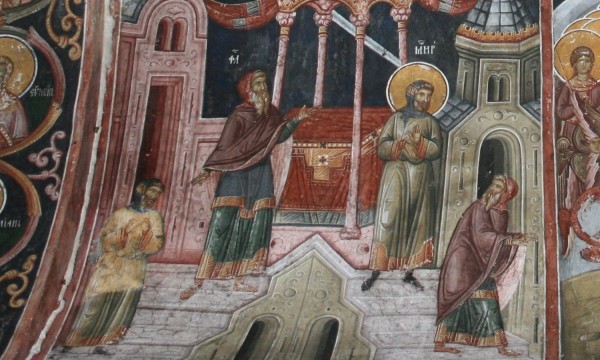Who among you does not recall the Gospel parable you heard today about the Publican and the Pharisee? It is such a well-known Gospel story of the Lord Jesus Christ Himself: short, clear, and memorable… In just a few words are depicted both one kind of person, and another kind of person – two people who went into the Temple. I will not repeat this story, precisely because it is so well known to each one of you. Is there any point in presenting the content of this parable for the fortieth (or even more) time?
It just so happens that in one community of very faithful people I was told that the Gospel reading does not need to be explained every Sunday, since, after all, the same Gospel readings are read on Sundays. “There are as many Gospel readings as there are Sundays in the year, and we already know all the Gospel stories that are read on Sundays.”
This is not at all the case! Not only do we not know, but we very often forget that which is most necessary for our spiritual life. That which was related by the Lord Jesus Christ in today’s parable happens to be most necessary for us! And although we supposedly remember this parable (there were two certain people that went into the Temple and prayed very differently; we can even picture them in the Temple: in front there stands the Pharisee and somewhere in the corner stands the Publican), we nonetheless completely forget the most important thing that this parable has to say, and sometimes we do not even understand it. Who were these two people that went into the Temple? Who was this Publican? For the fortieth time, or perhaps for the fiftieth, we need to remember who he was. The Publican was a collector of taxes. But the fact is that in those days taxes were not collected the way they are now: the person who collected them had the authority of the government to take from someone as much as he found necessary at his sole discretion. And he took as much as was necessary for him personally, plus what the government needed. And both in Judea, and in Palestine – even for two governments: for Judea and, moreover, for Rome, to which the Jews then paid tribute. Imagine what a Publican usually did with those from whom he levied taxes in this manner. Of course, these were people who, for the most part, were dishonest and hated by the people. Most of them probably hated themselves, because this was complete outrageousness, complete sin. This is who the Publican was who entered the Temple in the Savior’s story from today’s Gospel reading.
And the other one was the Pharisee. Today we have such misconceptions about Pharisees! We forget that Pharisees were the most respected people in that society, because this was a special part of the religious community that lived especially strictly, and therefore were possessed of great virtues. And these virtues were not lacking from that Pharisee described by today’s Gospel reading. We know this from the enumeration of virtues that the Pharisee himself made while standing in the Temple.
But the Publican, knowing who and what he was, prayed to God very simply: “God be merciful to me a sinner!” But the other one, the Pharisee, stood without praying, but rather listing his virtues: “Behold, Lord, how good I am: I fast twice a week, I pay tithes to the church out of my earnings… I am filled with virtues…” He does not see his sins at all. He even, turning and looking behind him, said: “I am not at all like other people – not like that Publican, who is there beating his breast and praying. I am something else!” And this brief story, or parable, ends in such a way that one leaves justified by God –that very Publican, the sinner – while the other, the Pharisee – who is not at all a sinner, but who performs very accurately all the prescriptions of the religious law – leaves condemned.
What is the meaning of this story? What can we learn from the Savior? Humility! One was humble, while the other was filled with conceit, pride, and vanity. He was not at all humble but, on the contrary, was proud. The Savior is teaching humility; the Savior is a teacher of humility. The Gospel of Christ is the Gospel of humility. It is the Good News of humility. The whole life of the Savior was filled with humility! And His death was of the same humility – the loftiest!… Humility, humility, humility…
So, allow me to ask you: do we not forget about this, about the very most important thing that Christ teaches? Do we understand the significance of humility in our spiritual life, in our religious life? Do we understand why humility saves us? If only we understood this, if only we felt this, if only we knew this, if only we always had this in mind – then, brothers and sisters in Christ, we who call ourselves Christians would all live differently! But this, which is the most important thing, we forget…
So why is it, however, that Christ Himself places humility at the foundation of the Christian life? Why humility? What significance does it have in and of itself – or, perhaps, not only in and of itself? Or perhaps not even in and of itself does it have such saving significance for us? In and of itself, humility has no significance. But the fact is that humility reveals love in us. A humble person will necessarily be a loving person: he humbles himself and his passions, the root of which lies in self-love. And therefore as soon as someone begins to struggle in humility, he cuts off this root of self-love and destroys self-love. Then there is opened up in him his innermost spiritual substance: the core – the ontological core, if you will – of our existence, of our substance: love, which makes us conformable to God Himself, for God is love. Humility serves to reveal the most important thing in man, that which links us to God Himself, that which makes us conformable to God Himself.
How often it is said: “Well, one mustn’t humble oneself so! One needs to have one’s honor; one must defend one’s dignity! But this – it’s incompatible with the humility that you’re offering us, which you Christians teach us!” But think of it like this, brothers and sisters: put on one side a proud person, who defends his own human dignity, and next to him put a loving and humble person. And judge for yourself: who has more human dignity? In which is human dignity expressed more distinctly, in which is it more visible, in which is it really present: in the one or in the other? Because he who lifts himself up, he who exalts himself, will be abased, as the Savior tells us; while he, on the contrary, who abases and humbles himself will be exalted, elevated by God’s grace, by God’s power, because such a person likens himself to God Himself, to Christ Himself; thus our conformity to God is revealed in us and it becomes active, active in love both for God and for people. Brothers and sisters! Let us not forget these words with which the Savior Himself completes today’s Gospel parable: “for ever one that exalteth himself shall be abased; and he that humbleth himself shall be exalted” (Luke 18:14). Amen.
February 23, 1975.
Translated from the Russian




















